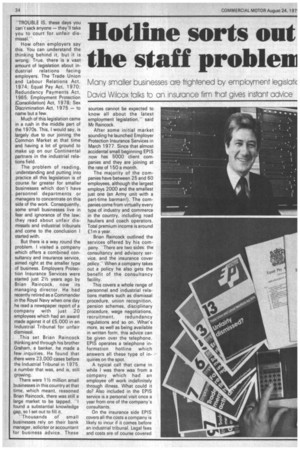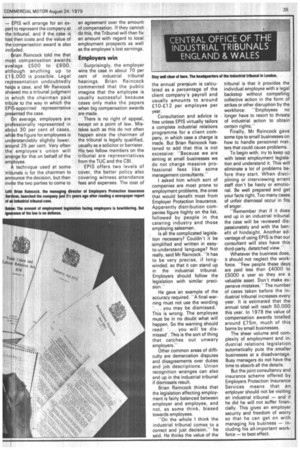Hotline sorts out the staff problem
Page 36

Page 37

If you've noticed an error in this article please click here to report it so we can fix it.
Many smaller businesses are frightened by employment egislatic David Wilcox talks to an insurance firm that gives instant advice.
"TROUBLE IS, these days you can't sack anyone — they'll take you to court for unfair dismissal."' How often employers say this. You can understand the thinking behind it, but it is wrong. True, there is a vast amount of legislation about in dustrial relations facing employers. The 'Trade Union and Labour Relations Act, 1974; Equal Pay Act, 1970: Redundancy Payments Act, 1965; Employment Protection (Consolidation) Act, 1978; Sex Discrimination Act, 1975 — to name but a few.
Much of this legislation came in a rush in the middle part of the 1970s. This, I would say, is largely due to our joining the Common Market at that time and having a lot of ground to make up on our Continental partners in the industrial relations field.
The problem of reading, understanding and putting into practice all this legislation is of course far greater for smaller businesses which don't have personnel departments or managers to concentrate on this side of the work. Consequently, some small businesses live in fear and ignorance of the law; they read about unfair dis missals and industrial tribunals and come to the conclusion I started with.
But there is a way round the problem. I visited a company which offers a combined con sultancy and insurance service, aimed right at the smaller type of business. Employers Protec tion Insurance Services were started just 21/2 years ago by Brian Raincock, now its managing director. He had recently retired as a Commander in the Royal Navy when one day he read a newspaper report of a company with just 20 employees which had an award made against it of £5,000 in an Industrial Tribunal for unfair dismissal.
This set Brian Raincock thinking and through his brother Graham, a banker, he made a. few inquiries. He found that there were 23,000 cases before the Industrial Tribunal in 1975, a number that was, and is, still growing.
There were 11/2 million small businesses in this country at that time, which meant, reasoned Brian Raincock, there was still a large market to be tapped. -I found a substantial knowledge gap, so I set out to fill it.
"Thousands of small businesses rely on their bank manager, solicitor or accountant for business advice. These
sources cannot be expected to know all about the latest employment legislation,said Mr Raincock.
After some initial market sounding he launched Employer Protection Insurance Services in March 1977. Since that almost accidental small beginning EPIS now has 5000 client companies and they are joining at the rate of 150 a month.
The majority of the companies have between 25 and 60 employees, although the largest employs 2000 and the smallest just one (an Army unit with a part-time barman!). The companies come from virtually every type of industry and commerce in the country, including road hauliers and coach operators. Total premium income is around £1m a year.
Brian Raincock outlined the services offered by his company. 'There are two sides: the consultancy and advisory service, and the insurance cover policy. ' When a company takes out a policy he also gets the benefit of the consultancy facility.
This covers a whole range of personnel and industrial relations matters such as dismissal procedure, union recognition, pension schemes, disciplinary procedure, wage negotiations, recruitment, redundancy regulations and so on. What's more, as well as being available in written form, this advice can be given over the telephone. EPIS operates a telephone information hotline which answers all these type of inquiries on the spot.
A typical call that came in while I was there was from a company which had an employee off work indefinitely through illness. What could it do? Also included in the EPIS service is a personal visit once a year from one of the company's consultants.
On the insurance side EPIS covers all the costs a company is likely to incur if it comes before an industrial tribunal. Legal fees and costs are of course covered — EPIS will arrange for an expert to represent the company at the tribunal, and if the case is lost then costs and the value of the compensation award is also included.
rian Raincock told me that mo t compensation awards av rage £500 to £600, alt ough anything up to ,000 is possible. Legal rep esentation undoubtedly hel s a case, and Mr Raincock sho ed me a tribunal judgment in hich the chairman paid trib te to the way in which the EPI -appointed representative pre ented the case.
n average, employers are pro essionally represented in ab ut 30 per cent of cases, whi e the figure for employees is un erstandably slightly lower, aro nd 25 per cent. Very often the employee's union will arr nge for this on behalf of the em loyee.
technique used at some tri unals is for the chairman to an ounce the decision, but then invite the two parties to come to an agreement over the amount of compensation. If they cannot do this, the Tribunal will then fix an amount with regard to local employment prospects as well as the employee's lost earnings.
Employers win
Surprisingly, the employer wins the case in about 70 per cent of industrial tribunal hearings. Brian Raincock commented that the public imagine that the employee is usually successful because cases only make the papers when big compensation awards are made.
There is no right of appeal, except on a point of law. Mistakes such as this do not often happen since the chairman of the tribunal is legally qualified, usually as a solicitor or barrister. His two fellow members on the tribunal are representatives from the TUC and the CBI.
EPIS offers two levels of cover, the better policy also covering witness attendance fees and expenses. The cost of








































































































